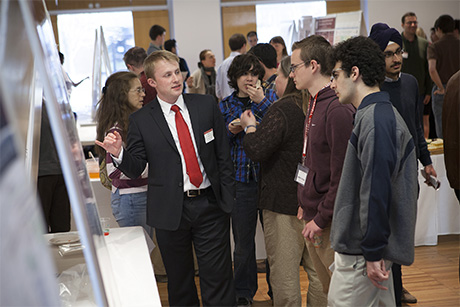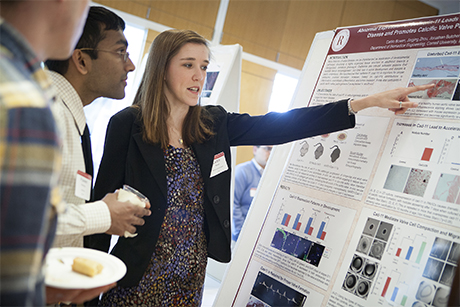Undergrads convey their research prowess at forums
By Blaine Friedlander
Beyond the buds and the daffodils, another spring rite emerges: undergraduate research presentations.
About 140 students presenting 115 individual pieces of research gathered for the 29th annual Cornell Undergraduate Research Forum April 16 at Duffield Hall, while 45 seniors convened for the Hunter R. Rawlings III Cornell Presidential Research Scholars Senior Expo 2014, April 17 at the Biotechnology Building.
Ranging from cancer research and possible pharmaceuticals for diabetics to cooking a better steak, almost 200 undergraduates conveyed their academic prowess.

Cornell Undergraduate Research Board
Michelle Duong ’14 showed that an environment influences food intake. In two focus groups – each before a bowl of chocolates – the people who discussed gym memberships ate fewer sweets than those who discussed a nonhealth topic.
In her research, Shanique Alabi ’14 learned that Canada goldenrod (Solidago canadensis), which she found at the Cornell Plantations, may offer promise as a carbohydrate digestion blocker for diabetics.
Jessica Lebovits ’14, Nolan Reese ’15, Janet Kim ’15 and Olivia Roche ’15 studied the culinary learning process of off-campus college students to ascertain nutrition among young adults. Louis Levine ’16, Rachel DeMel ’14, Camille Kapaun ’14 and Paige Mintz ’15 learned how off-campus students manage their time in preparing meals with the aim of improving their meal choices.
Conor Gruber ’15 studied the early detection of circulating tumor cells in pancreatic cancer, working toward an assay that ascertains cellular nuances; and Karen Martin ’15 examined the process of RAC1 proteins as it relates to metastatic cancer.
While Marissa Tranquilli ’15, Simeon Markind ’14, Katherine Bruce ’14 and Benjamin Catanese ’14 characterized the carbohydrate content of the Ithaca Beer Company’s Apricot Wheat and Green Trail beers with high performance liquid chromatography-refractive index detection, other student chemists Janette Guijosa ’14, Sarah Goodnow ’14, Daniel C. Lee ’14, Harrison Specht ’14 and Ashley-Lauren Mighty ’14 provided an aroma profile of Ithaca Beer’s Flower Power IPA in various stages of production.

Rawlings Cornell Presidential Research Scholars
Rachel Lumish ’14 correlated pica behavior (consuming non-food items like chalk, ice, powder, soap and dirt) and its relationship with iron deficiency among pregnant teens. And Quinn Kelly ’14 analyzed bicycling policies in major American cities, with an eye toward improving sustainable transportation. He found that cities with the strongest bicycling organizations had the strongest cycling infrastructure and policies, and the largest amount of cyclists.
James Zen Yui ’14 showed how to save energy and grill a better steak by pre-cooking the meat in a vacuum-sealed plastic and storing it in water, which keeps the meat tender. When ordered in a restaurant, the juicy so-called sous vide steak is grilled for a few minutes.
To create equity in discrimination lawsuits (based on Title VII of the Civil Rights Act of 1964), Hannah Clark ’14 assembled a database of factors that correlate with larger settlements and relief clauses in settlement documents.
Spenser Reed ’14 evaluated chicken as a potential model for an inexpensive and sensitive zinc biomarker to quickly assess human nutritional needs, while Joseph Edwards ’14 explained how he used electrospinning and electrospraying to create membranes that use biochar to trap volatile organic compounds, for possible use as a smokestack filter.
Media Contact
Get Cornell news delivered right to your inbox.
Subscribe